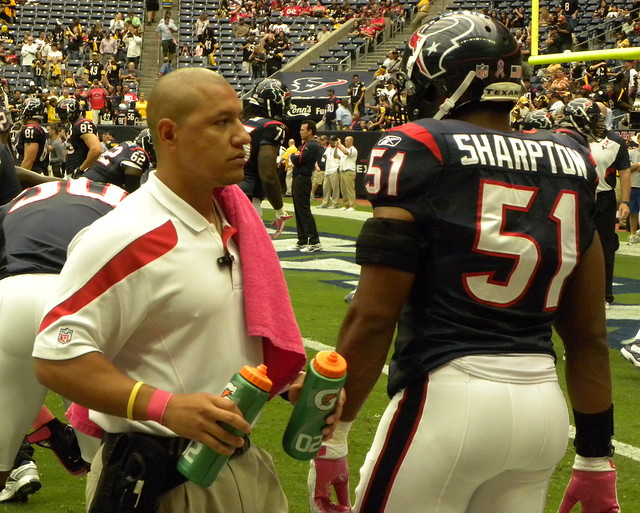Pro Football, Not–So-Pro Physicians
by Annika Carter
In my hometown, I used to drive by a physical therapist office that boasted a sign reading “Official Physical Therapist of the Atlanta Falcons.” I remember thinking, Wow, if they treat the Falcons, they must be excellent doctors. I have to go there if I ever get injured! Seems legitimate right? If the doctors are good enough to treat some of this country’s strongest athletes, they must be good enough to treat my simple knee injury, right? Some National Football League players might disagree.
In 2004, the NFL introduced a policy prohibiting teams from creating contracts with medical organizations that require players to use doctors from that medical organization. The idea was that, by allowing players their own choice in doctors, players could receive care from physicians they trust. Ray Lewis, linebacker for the Baltimore Ravens in the 2012-2013 season, opted for non-affiliated medical treatment after injuring his triceps in 2013. Troy Vincent, ex-defensive back and president of the NFL players’ association, argues that there is not enough enforcement of this statute. Vincent additionally states that if the NFL were to look deeper into the contracts between teams and medical organizations, they would find violations. Although he believes that doctors have the intention to aid the players, Vincent believes that money can often get in the way: “We know there’s a business side that sometimes sneaks its way in and causes a conflict of interest.”

Photo credit: The Brit_2 / Foter / CC BY-NC-ND
These conflicts of interest could prove to be more than their delicate name may imply. The partnerships between healthcare facilities and NFL teams are more mutualistic than they used to be. While years ago NFL teams would hire physicians to care for their players, now associations will pay up to $1.5 million per year in order to send their doctors to work with the team. Although medical ethics prohibit an organization or doctor from putting monetary gain above the quality of service, most teams hire the highest bidder. These healthcare organizations often have even greater financial interest in the teams, owning parts of the franchise, gates, as is the case with the Cleveland Clinic owning a gate at the Brown’s stadium, or even training facilities. The University of Pittsburgh Medical Center now shares its name with the Steeler’s $30 million training facility. The immense focus on finances creates a sense of distrust between players and physicians, and can lead to treatment and confidentiality suffering.
Although the doctors serve to care for the players over all else, they are undoubtedly influenced by the team that is providing them with a banner to hang on their sign (“Training Center of the Atlanta Falcons”) and have no intent to ruin the partnership they spend millions to create. These conflicts of interest between care and money appear especially in deciding whether a player is fit to return to play or not. Doctors may want to rush a player’s recovery time for the benefit of the team, but the player may not be fit to return to play. In 2002 such an incident occurred when, now-ex Jaguar linebacker Jeff Novak filed a $7.8 million suit against team physician Stephen Luce who returned Novak to the field before a serious bone bruise healed. The injury was not fully healed by the time Novak returned to play, resulting in a serious infection and Novak’s eventual retirement from the NFL. Novak won $5.3 million from the case.
Confidentiality with team physicians can also be impaired because the information doctors receive can be considered part of the team’s employment record. As agents of the team, the physicians themselves, too, are unlikely to debate handing medical information over to the team’s owners. Although most cases do not cause any legal concern as they do not contradict with the Health Insurance Portability and Accountability Act of 1996, players are often aware of this lessened confidentiality. As a result, players may not share all their information with their team physicians, leading to possible incomplete or incorrect diagnosis.
Due to the morality issues often associated with NFL teams’ medical contracts, Dr. Andrew Bishop, then-Atlanta Falcons team physician, told the New York Times in 2004 that he would resign should the Falcons enter into a medical contract. Bishop told the Times, “It compromises you as a physician. The perception is that if this individual was so eager to do this that he’s willing to pay to do it, then he’s going to do whatever management wants to keep the job he paid for.”
Football is a high-contact sport with perhaps the most injuries of any professional sport in the United States. NFL teams deserve doctors willing to donate as much time to healing injuries as the players give to the game. Unfortunately, with the influence of money in the back of their minds, NFL team physicians are thinking less and less about the good of the players and more and more about the thickness of their pocketbooks. This corrupt system has created a professional sport aided by the least professional of physicians.
